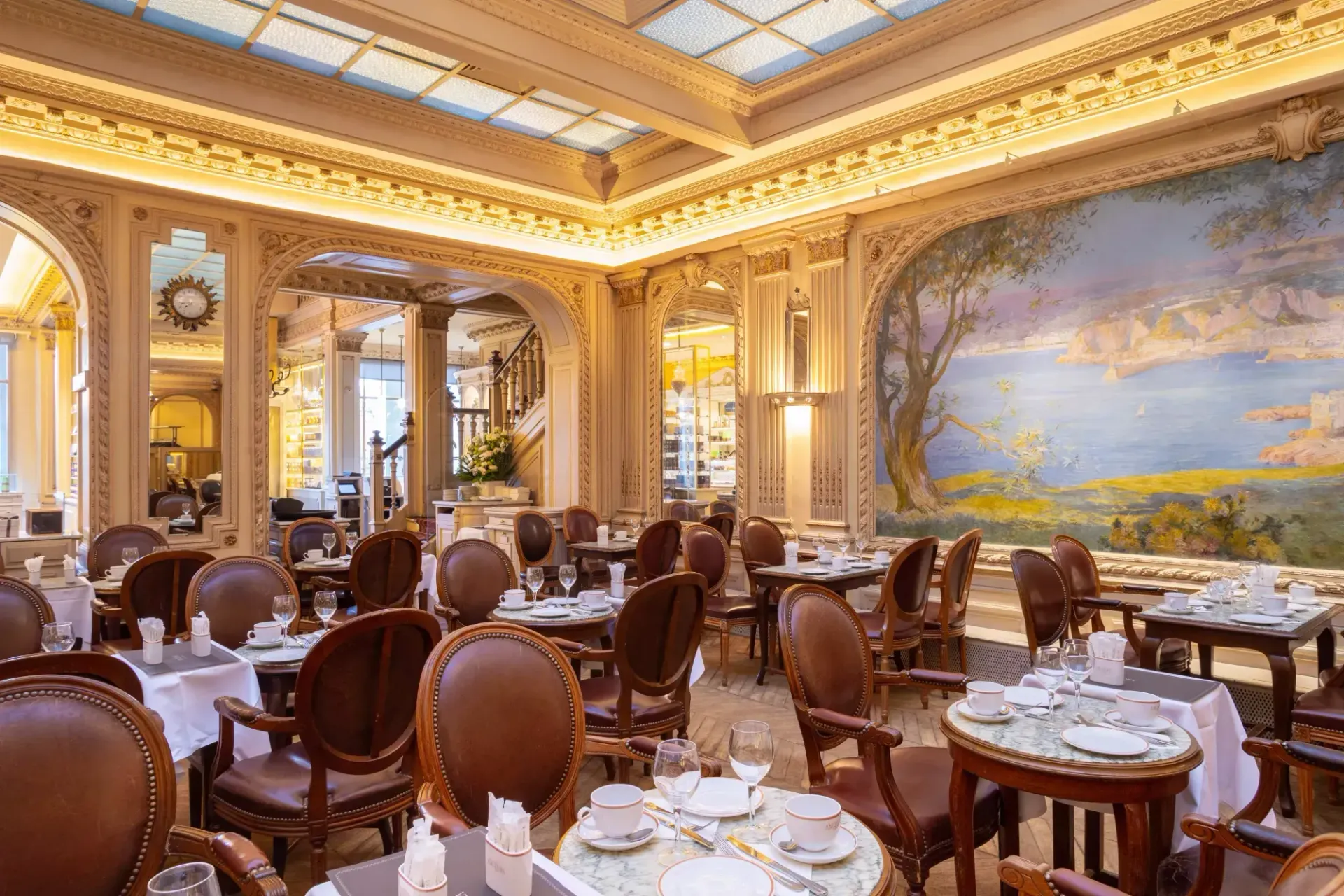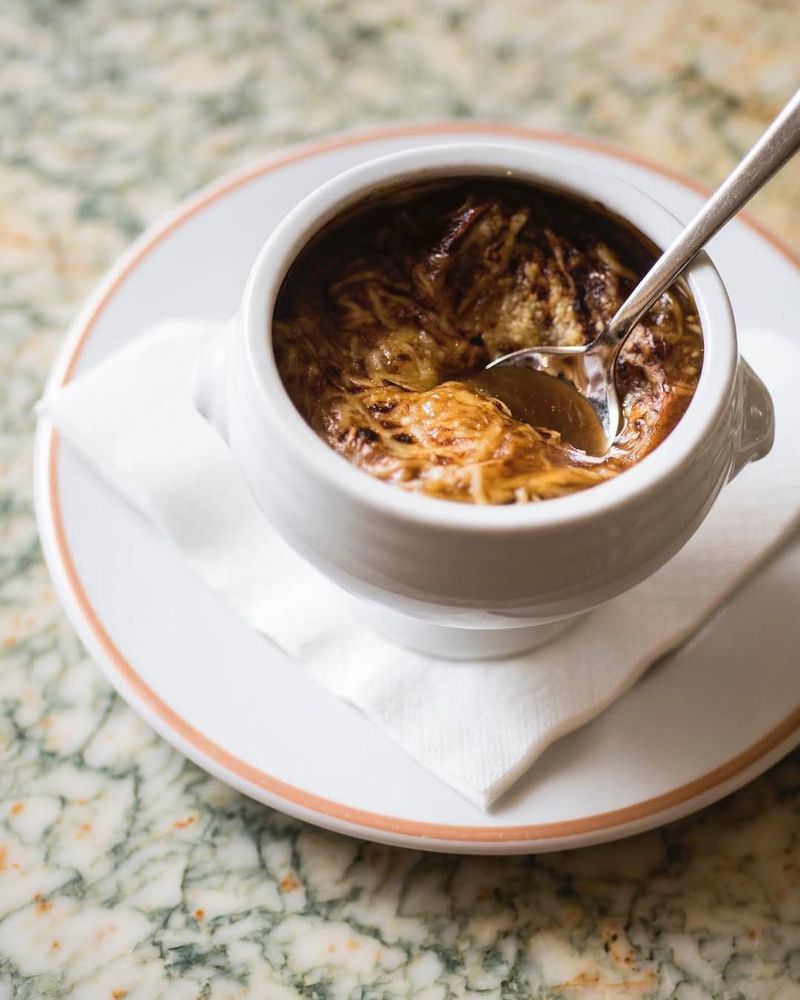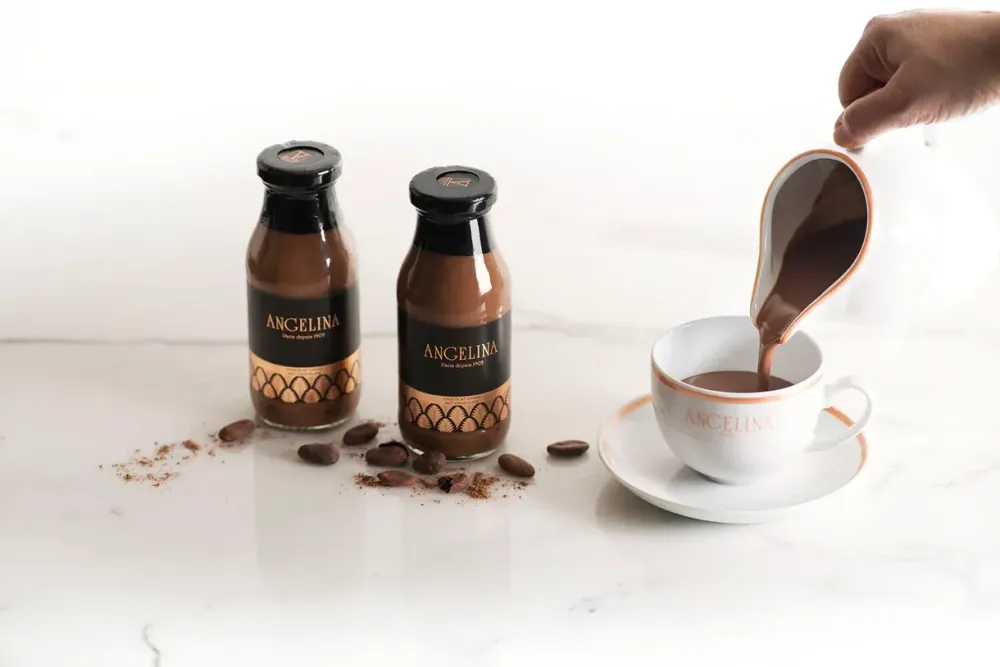David Litwak: I’m very curious—I noticed while doing a bit of research that you’ve also expanded into packaged chocolate and ice cream. How are you thinking about innovation outside the four walls of your locations? In other words, beyond just launching in more countries?
Anthony Battaglia: That’s a very interesting question. It actually started in Paris with our tourist guests. They wanted to bring something home from Angelina—whether it was a porcelain cup and saucer, hot chocolate, or little candies. Those became souvenirs.
Then during COVID, when the dining room was closed for the first six months, we needed another source of revenue. Besides catering and grab-and-go options through delivery platforms, we looked for ways to generate income beyond our physical locations.
That’s how we launched our website, which now represents 20% of our annual revenue. We ship every day, all over the country.
Anthony Battaglia: We have boxes going out daily—to Minnesota, Las Vegas, Chicago—really all over the country. We ship a collection of high-end épicerie fine products.
This includes a range of tea boxes—we offer eight different flavors, available both loose and in bags. We also have our signature hot chocolate. It’s the same recipe we’ve used for over 120 years. Whether it’s in bottled form or powder for our dairy-free guests, they can mix the chocolate powder with water or whatever liquid they prefer.
We also offer a high-end selection of chocolates—crispy crêpes coated in dark chocolate, salted caramels, and more. These sell really well on our website, but also through partnerships with other businesses.
For example, Cartier and Van Cleef & Arpels order Angelina products during Christmas, Mother’s Day, or Valentine’s Day to offer their clients. It really represents the pinnacle of Parisian épicerie fine.
David Litwak: That’s very cool. We’re actually starting our own snack bar here for members—something where they can grab soup or a small bite after they’ve had a drink or two. One of the reasons we’ve partnered with you is because we don’t have a kitchen, so we rely on your team.
But we do need something in between—something to offer when someone wants to hang out a bit longer, and we don’t have a chef in or haven’t catered for the evening. So we should definitely explore that.
Anthony Battaglia: I don’t know if you’ve visited our location on the Upper East Side, but we don’t have a dining room there—it’s a grab-and-go space.
We offer salads, sandwiches in different sizes, and some great pre-made ice cream cups that are super popular. We also have a collection of what we call gâteaux de voyage, or “traveling cakes”—things like diamond cookies, financiers, and mini financiers in bite sizes.
It works really, really well.
David Litwak: I’m not sure how much of the history you know—you mentioned it earlier that there was an earlier spot you opened that failed, can you tell us about that?
Anthony Battaglia: Yes, we opened what is now known as Angelina, but back then, it was named after the founder—Rumpelmayer. The Rumpelmayer café was located in the Hotel de Berne, in Midtown.
David Litwak: I don’t think I know it. I’ve only been here seven years, so that’s a bit before my time.
Anthony Battaglia: Okay. Very cool.
David Litwak: Well what was the biggest challenge for you coming to America? You’ve expanded to many other places before trying New York again. Was there a reason behind that? Did you feel more pressure being in New York, where it feels like the eyes of the world are on you?
Anthony Battaglia: To be honest, we sort of missed our opening [curing COVID]. Our Francophone and Francophile guests weren’t in town. The French community had gone back to France. The people who know Angelina Paris and have their routines there weren’t in New York.
A lot of them left the city for their second homes, so it was challenging to let them know we were here. And even today, after being open for almost four years, a lot of people still don’t know we’re in New York. We continue to surprise guests who already know the brand from Paris.
Many of our guests in Paris are American. They were the ones requesting us to come to their hometown—New York.
So I’d say the biggest challenge, to be transparent, is making sure our Paris team understands the habits of New Yorkers. When guests come to Paris, they’re in France—they’re looking for that French art de vivre.
But when we’re in New York, we’re on their territory, in their country. We have to be much more aware of their expectations and needs.
David Litwak: Is it kind of like, when people are in Paris, they’re seeking novelty and a Parisian experience, but when they’re in New York, they’re looking for routine—something that can become part of their daily or weekly life?
Anthony Battaglia: Exactly, exactly.
It took us some time—and for my pastry chef especially—to understand that we needed to have a cheesecake in the pastry case. A lot of people came in asking for it. They’d say, “We love Angelina Paris, but do you have a cheesecake?” It’s one of the most popular pastries in the city.
So, we made our own version of a cheesecake. And guess what? It’s now the second or third best-selling pastry in our case.
David Litwak: You don’t have a cheesecake in Paris?
Anthony Battaglia: No.
David Litwak: Is that a distinctly American thing? Like one of those examples—kind of like how General Tso’s chicken is actually an American-Chinese food invention?
Anthony Battaglia: It was really just about listening to our guests. They wanted something they enjoy on a regular basis, so we created our version of cheesecake.
It’s the same with the cheeseburger. Paris didn’t have a cheeseburger for a while. They had the croque monsieur—your classic ham and cheese sandwich—but not a cheeseburger.
We also have sundaes—a great selection that we mix with macarons. Always done with French flair, but designed for New Yorkers who are looking for something they can enjoy every day.
David Litwak: When you mentioned macarons earlier, it made me think of some of the famous macaron places. That brings me to one of my last questions: how have you thought about collaborations? Are you working with influencers, other brands, or even other French brands that are already in America?
Anthony Battaglia: Following the same strategy of bringing Angelina outside its walls—especially with the need for additional revenue—I had to get creative.
I actually started my career as a caterer. Daniel Boulud brought me to New York, and I was catering for his boutique company called Feast and Fêtes on the Upper East Side.
Through that, I saw the growing need among fashion companies to integrate hospitality into their brand experience.
For example, I don’t know if you’ve been to Cartier recently, but the first thing they do when you arrive is bring you upstairs to their hospitality center. Then a salesperson comes to meet you, and that’s where they begin building a relationship with you before taking you downstairs to view the jewelry.
A lot of other companies are doing similar things. For example, if you go to Hermès looking to buy porcelain—especially during the end-of-year period—most weekends they’ll offer you hot chocolate from Angelina. You get to enjoy their porcelain while sipping Angelina’s signature hot chocolate.


